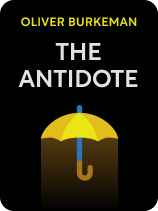

This article is an excerpt from the Shortform book guide to "The Antidote" by Oliver Burkeman. Shortform has the world's best summaries and analyses of books you should be reading.
Like this article? Sign up for a free trial here.
Do you rush into things just to avoid uncertainty? How well do you distinguish between real and perceived threats?
Oliver Burkeman asserts that being comfortable with uncertainty can diminish fear and anxiety, leading to deeper, more genuine happiness. This approach encourages you to find joy amidst the unpredictability of life, rather than striving for control.
Continue reading to learn three methods that Burkeman recommends for feeling more comfortable with impermanence and uncertainty.
#1: Embrace Life’s Transience
To be comfortable with uncertainty, embrace the transient nature of things. Acknowledge the fleeting nature of thoughts, emotions, and life itself to deepen your engagement and appreciation for each passing moment. For example, while washing dishes, observing the swift dissipation of soap bubbles can serve as a reflection on impermanence and your inevitable death.
(Shortform note: In addition to deepening your appreciation for life, acknowledging impermanence also helps you feel less fearful of losing the things you love. According to Jay Shetty (Think Like a Monk), your fears point you toward what you’re afraid of losing—the things you’re most attached to. However, when you accept that you can’t control how long any of these things will stay in your life, you change your relationship to the things that bring you fear: Instead of trying to control and hold onto the things you care about, you’re able to appreciate and enjoy what you have.)
#2: Acknowledge Discomfort in Uncertainty
Burkeman advises embracing unease when confronting the unknown rather than rushing to resolve it. Accepting discomfort curbs impulsive, ill-considered decisions by providing mental space to consider alternatives. For example, if you lose your job, instead of rushing to grab the first available job, take time to reflect on your next move.
(Shortform note: Consider this approach a form of mental resilience training: Each time you withstand the urge to make a hasty decision, you strengthen your tolerance for ambiguity. One way to put this into practice is to keep a journal where you note your experiences of uncertainty and their eventual outcomes. For example, if you once hesitated about taking a new job offer and waited, you might record how that decision led to an unexpected opportunity a few weeks later. Reflecting on these experiences may reveal that most anxieties never come to pass—according to one study, 91.4% of the things we worry about don’t come true, reinforcing the idea that immediate action isn’t always the best response.)
#3: Confront Your Fears
Burkeman writes that you should identify and face your fears head-on to differentiate between actual and perceived threats. This discernment diminishes their hold over you, enabling you to act with less anxiety. For example, deliberately confronting your fear of public speaking can reveal it’s more manageable than you imagined.
(Shortform note: While this may sound like an uncomfortable process, you might enjoy it. According to Steven Kotler (The Art of Impossible), doing activities that are outside of your comfort zone—and therefore feel risky—triggers dopamine spikes. This means that you’ll experience pleasure each time you attempt to confront your fears.)

———End of Preview———
Like what you just read? Read the rest of the world's best book summary and analysis of Oliver Burkeman's "The Antidote" at Shortform.
Here's what you'll find in our full The Antidote summary:
- Why forcing yourself to think positive thoughts doesn't make you happy
- How typical self-help advice can sometimes make you feel worse
- How to experience contentment even amid seemingly negative experiences






